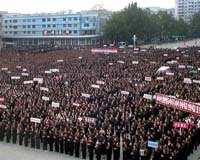| . |  |
. |
Anseong, South Korea (AFP) May 28, 2009 North Korea hailed its latest nuclear test as an inspiration to its people, but refugees fleeing the impoverished state say the money should be used to feed the hungry instead. "When North Korea conducted the first nuclear test, I took great pride in it. I felt my country was so powerful then," said a 35-year-old defector at a South Korean resettlement centre southeast of Seoul. "I heard North Korea conducted a second test. I don't see any point in doing it again. The money should have been spent to improve the lives of people." More than 15,000 North Korean refugees have come to South Korea since the end of the 1950-1953 Korean war to flee hunger or repression. North Korean leader Kim Jong-Il presided over a famine in the 1990s that by some estimates killed one million people, but he still finds resources for weapons development that resulted in a first nuclear test in October 2006. The North, which has warned it could launch a military attack on the South, said its second nuclear test on Monday was "greatly inspiring the army and people." But some refugees here tell a different story. "Maybe the elite ruling party members are proud of it. But it has nothing to do with ordinary people. North Korea should have spent its resources on feeding its poor," said a 41-year-old defector. "North Korea has a huge army. It has long been tightening its belt to build up its military. But in reality, some soldiers are suffering from malnutrition. I don't think war will break out. If it does, the South will win." The authorities asked that none of the defectors be named for fear of reprisals against relatives back in the North. The Hanawon resettlement facility, ringed with fences and tightly guarded by police, is the first stop for North Koreans who have fled their impoverished hardline communist homeland. The vast majority cross into China, which repatriates those whom it catches, and then move to Southeast Asian nations before ending up in South Korea. The refugees -- more than 60 percent of whom are women -- learn how to survive in an affluent capitalist democracy where they sometimes even struggle to understand the local dialect. Refugees worry they will be seen as troublemakers south of the border, said Young Miryang, director general of the centre. "They have a feeling that South Koreans look down on them," Young said. Arrivals are given two months of basic job training, information on South Korea and lessons in survival skills -- such as buying a subway ticket, opening a bank account and using a credit card. Some suffer from contagious diseases such as tuberculosis and many need false teeth because they have lost molars to malnutrition. The UN's World Food Programme warned in December that nearly nine million North Koreans -- about 40 percent of the population -- were in urgent need for food aid, including young children, pregnant and the elderly. Since the 1990s famine North Korea has relied on overseas aid to feed millions of its people, but in March Pyongyang refused to accept further food aid from the United States. South Korea, another key provider, last year did not make its customary shipment of hundreds of thousands of tons of rice and fertiliser because the North failed to request the deliveries. Despite the many potential challenges they face, the refugees here hope they can find a better life in the capitalist South. "So far, so good. I feel at home. I hope South Koreans do not look down on me," said a 42-year-old female defector. Share This Article With Planet Earth
Related Links Learn about nuclear weapons doctrine and defense at SpaceWar.com Learn about missile defense at SpaceWar.com All about missiles at SpaceWar.com Learn about the Superpowers of the 21st Century at SpaceWar.com
 NKorea hails nuclear test as UN weighs response
NKorea hails nuclear test as UN weighs responseSeoul (AFP) May 27, 2009 North Korea held a mass rally to celebrate its nuclear test and reportedly restarted a plutonium-producing plant, as world powers pondered how to punish the communist state for its defiance. Unfazed by international anger at its second bomb test, Pyongyang has also test-fired six short-range missiles and reportedly intensified military exercises in regions close to South Korea. The United ... read more |
|
| The content herein, unless otherwise known to be public domain, are Copyright 1995-2009 - SpaceDaily. AFP and UPI Wire Stories are copyright Agence France-Presse and United Press International. ESA Portal Reports are copyright European Space Agency. All NASA sourced material is public domain. Additional copyrights may apply in whole or part to other bona fide parties. Advertising does not imply endorsement,agreement or approval of any opinions, statements or information provided by SpaceDaily on any Web page published or hosted by SpaceDaily. Privacy Statement |